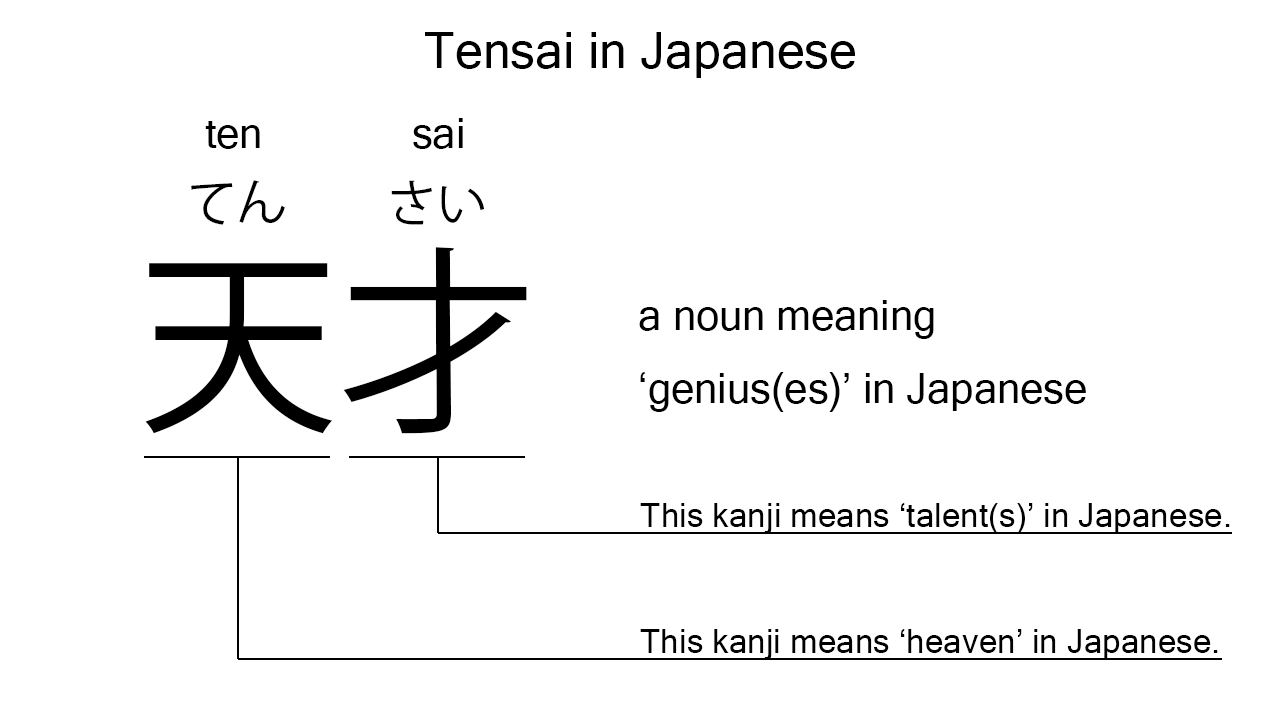What does “tensai” mean in Japanese?
There are homophones, but native speakers say “tensai” often to mean ‘genius’ in Japanese. Perhaps, some Japanese learners know this word as it is sometimes used in Japanese movies, novels, manga, anime, and the like. In this blog post, however, I will explain this word in detail based on its kanji expression. And also, I will explain how to use it through example sentences. My explanations would help Japanese learners understand “tensai” more clearly. Then, let’s get started!
Contents
Definition and meaning of “tensai”
Let me start with the definition and meaning of “tensai”.
- tensai – 天才 (てんさい) : a noun meaning ‘genius’ in Japanese. This can also work as plural. Learn more about Japanese plural.
Native speakers use this noun to refer to a very talented person or people in Japanese. It’s also worth mentioning here that this noun rarely refers to their abilities.
The definition and meaning are simple and clear. To understand this noun more clearly, however, let me explain its kanji characters in detail, one by one.
What does “tensai” literally mean in Japanese?
The kanji expression of “tensai” consists of the following two kanji characters:
- 天 : a kanji character used to mean ‘heaven’ or ‘sky’ in Japanese.
- 才 : a kanji character used to mean ‘talent’, ‘gift’, or ‘ability’ in Japanese.
These two kanji characters tell us that “tensai” literally means a ‘talent from heaven’ in Japanese. This literal interpretation is not completely in line with the actual meaning, but still understandable, I think. In Japanese, geniuses can be considered as those who have received talents from heaven.

When we meet new kanji expressions, we should check their kanji characters in detail to understand their meanings clearly and deeply. In many cases, kanji characters tell us a lot about the meanings of the expressions they form. Actually, here, we could get the better understanding of “tensai” through the detailed kanji check above.
So far, I’ve explained the definition and meaning of “tensai” together with its kanji characters. Then, let me explain how to use it through the example sentences below.
Example #1: how to say “genius” in Japanese
watashi no musume wa geijutsu no tensai desu – 私の娘は芸術の天才です (わたしのむすめはげいじゅつのてんさいです)
My daughter is a genius of art.
Below are the new words used in the example sentence.
- watashi – 私 (わたし) : a pronoun meaning ‘I’ in Japanese.
- no – の : a case particle used after a noun or pronoun to make its possessive case. In the example, this is used after “watashi” to make its possessive case, “watashi no“, which means ‘my’ in Japanese.
- musume – 娘 (むすめ) : a noun meaning ‘daughter’ in Japanese. This can also work as plural.
- wa – は : a binding particle working as a case marker or topic marker. In the example, this works after “watashi no musume” to make the subject in the sentence.
- geijutsu – 芸術 (げいじゅつ) : a noun meaning ‘art’ in Japanese.
- no – の : a case particle joining two nouns. Normally, the first one can work as a modifier to describe the second. In the example, this works to join “geijutsu” and “tensai”. The formed phrase literally means ‘a genius of art’ in Japanese. Word orders in Japanese and English are different, but the role of this case particle is similar to that of the English preposition, “of”.
- desu – です : an auxiliary verb used after a noun or adjective to make it polite. Probably, this is well known as a part of Japanese desu form. In the example, this is used after the noun phrase, “geijutsu no tensai”, to make it sound polite.
This is a typical usage of “tensai”. In this example, it works as a part of the noun phrase, “geijutsu no tensai”, which means ‘a genius of art’ in Japanese. When we want to say “genius” in Japanese, anyway, this noun is a very good option.
Example #2: another usage of “tensai”
kodomo tachi wa min’na tensai desu – 子供達は皆天才です (こどもたちはみんなてんさいです)
All children are geniuses.
Below are the new words used in the example sentence.
- kodomo – 子供 (こども) : a noun meaning ‘child’ or ‘kid’ in Japanese. This can also work as plural.
- tachi – 達 (たち) : a suffix used after a noun or pronoun to make its plural form. In the example, this is used after “kodomo” to make its plural form, “kodomo tachi”, which means ‘children’ in Japanese.
- min’na – 皆 (みんな) : a noun meaning ‘everyone’ in Japanese. This can also work to emphasize a plural noun with adding the meaning of ‘all’ or such. In the example, this works to emphasize “kodomo tachi” with adding the meaning of ‘all’.
This is another typical usage of “tensai”. In this example, it works as plural to say “geniuses” in Japanese. When we want to say “geniuses” in Japanese, this noun is a very good option.
Summary
In this blog post, I’ve explained the definition and meaning of “tensai” in detail based on its kanji expression. And also, I’ve explained how to use it through the example sentences. Let me summarize them as follows.
- tensai – 天才 (てんさい) : a noun meaning ‘genius’ in Japanese. This can also work as plural. These two kanji characters literally mean a ‘talent from heaven’ in Japanese. This literal interpretation is not completely in line with the actual meaning, but still understandable, I think. In Japanese, geniuses can be considered as those who have received talents from heaven.
Hope my explanations are understandable and helpful for Japanese learners.